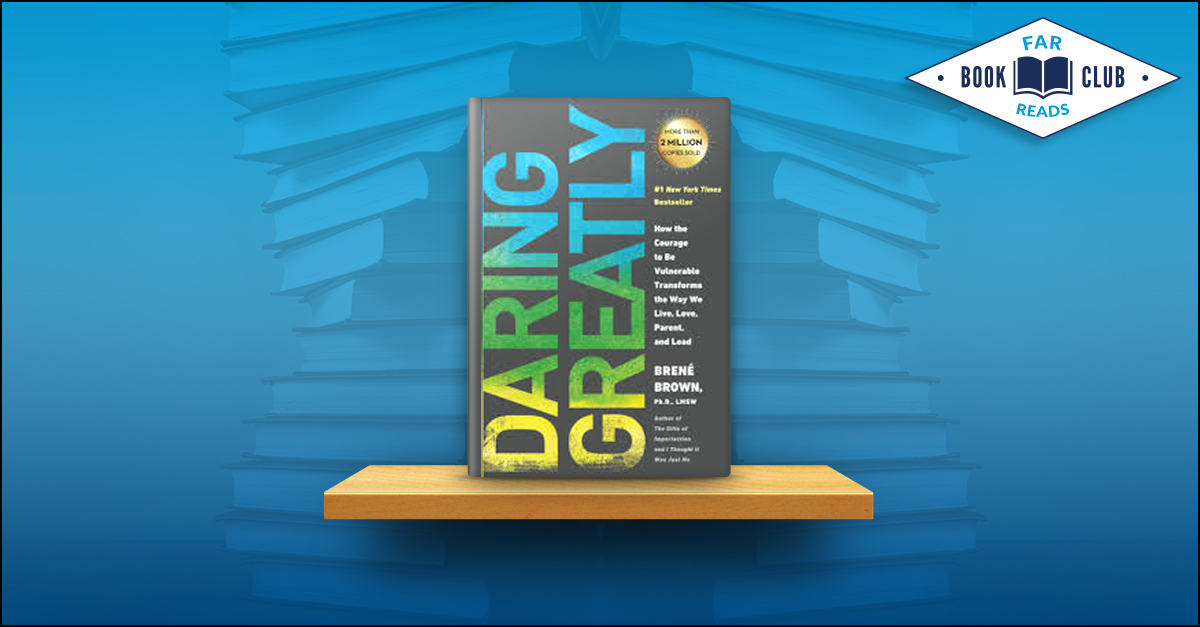
Our latest Far Reads book
club pick was “Daring Greatly: How the Courage to Be Vulnerable Transforms the Way We Live, Love, Parent, and Lead” by
Brené Brown. Here’s our recap.
Who Selected It
The team
Why We Selected It
We tried a new approach to book club this time, splitting into two groups to read two different books on two different topics. The team first voted on several topics of interest and we selected the top two—teamwork and positive thinking/mindset—then
found books that fell into those two categories. Team members picked the area that most interested them and voted on the books in that category. The positive mindset group selected Daring Greatly, primarily because there are several Brené Brown
fans in the group. (If you’re curious, the teamwork group selected “ Team of Teams” by Gen. Stanley McChrystal. Stay tuned for that
recap!)
What It’s About
If you’re not one of the tens of millions of people who’ve watched Brown’s 2010 TED talk, The Power of Vulnerability,
or the less-viewed but certainly no less powerful Listening to Shame, I highly recommend you take 40 minutes to check them out.
I promise they will open your eyes to the power of these two emotional states.
In Daring Greatly, Brown distills down her twelve years of research on vulnerability, along with her personal experience, to explain what makes us fearful of vulnerability, how that fear shows up in our lives, how not allowing ourselves to be vulnerable
negatively affects us, and how overcoming the fear of vulnerability can transform our lives for the better.
Lessons Learned
We learned a lot about ourselves and others reading this book. We realized that we’re not alone in our fears and that embracing vulnerability will help us live up to our potential. We understand now that it takes courage to live a meaningful life
and that we should look for opportunities to be vulnerable instead of running away from them.
We also learned the role shame plays in keeping us from being vulnerable and how shame is the silent killer of creativity and innovation. Shame shows up when we care too much about what other people think of us. When we’re terrified of what others
will think, putting ourselves “in the arena,” as Brown would say, is unthinkable. She quotes Peter Sheahan, an author, speaker, and CEO of ChangeLabsTM:
“Every time someone holds back on a new idea, fails to give their manger much needed feedback, and is afraid to speak up in front of a client, you can be sure shame played a part. That deep fear we all have of being wrong, of being belittled and of feeling less than, is what stops us taking the very risks required to move our companies forward.”
This is why developing a resilience to shame is necessary for vulnerability—and ultimately, creativity and innovation—to be possible.
Our Favorite Quote
Though there are several quotes we pulled from our reading, it’s hard not to share the one that inspired the book. It’s from a Teddy Roosevelt speech in 1910:
“It is not the critic who counts; not the man who points out how the strong man stumbles, or where the doer of deeds could have done them better. The credit belongs to the man who is actually in the arena, whose face is marred by dust and sweat and blood; who strives valiantly; who errs, who comes short again and again, because there is no effort without error and shortcoming; but who does actually strive to do the deeds; who knows great enthusiasms, the great devotions; who spends himself in a worthy cause; who at the best knows in the end the triumph of high achievement, and who at the worst, if he fails, at least fails while daring greatly, so that his place shall never be with those cold and timid souls who neither know victory nor defeat.”
How We’re Applying What We Learned
Brown describes the concept of scarcity, in which we start each day with a mindset of “never enough.” We feel we didn’t get enough sleep; we don’t have enough time; we can’t get enough done; and on and on. To combat this
scarcity mindset, several of us have begun (or recommitted to) a practice of gratitude. Recognizing all we have to be thankful for instead of focusing on what we don’t have helps offset our propensity to highlight the negative.
We’re also trying to recognize shame when it shows up and resisting the inclination to hide when it does, helping us to develop our shame resilience muscles.
During our discussions, we recognized that when it comes right down to it, we’re paid to solve problems, using our experience to produce value for clients with unique needs. We’ll never have all the answers up front, and it requires vulnerability
to admit this. We understand better after having read this book that it’s ok not to have all the answers from the very beginning. What’s important is that we have the skills and determination to find the answers that will lead us to the
best solution.
Overall, we’re all striving to allow vulnerability to play a bigger role in our lives, both personally and professionally. We’re giving more and holding back less. We’re doing hard things even though we might fail and, in doing so, we’re
setting a positive example for our team, our clients, and our families.
What’s Next
The Team of Teams group will share their recap early in the new year. Until then, stay curious, friends!